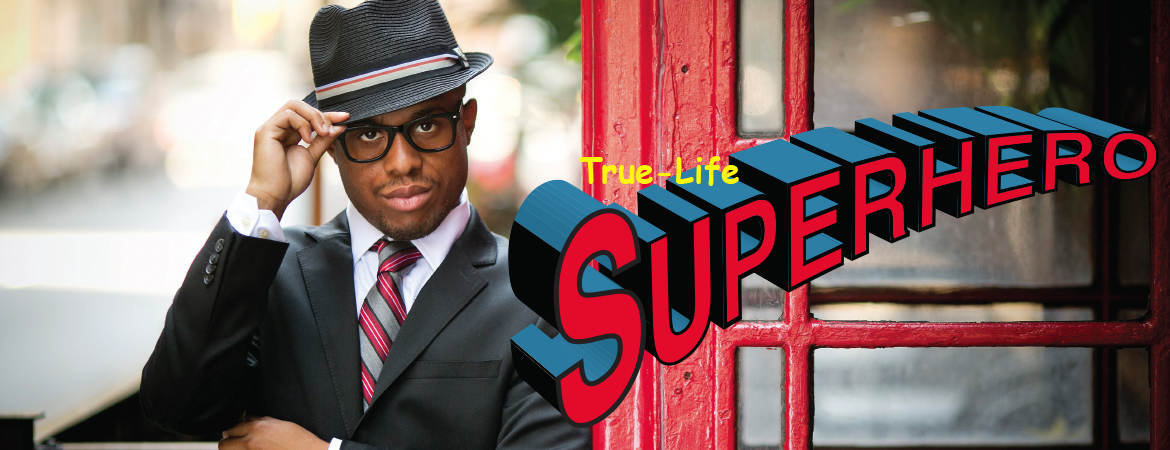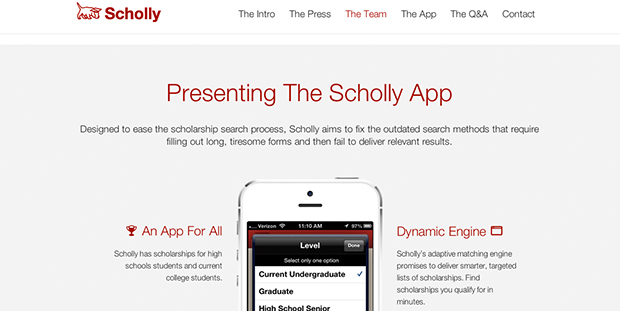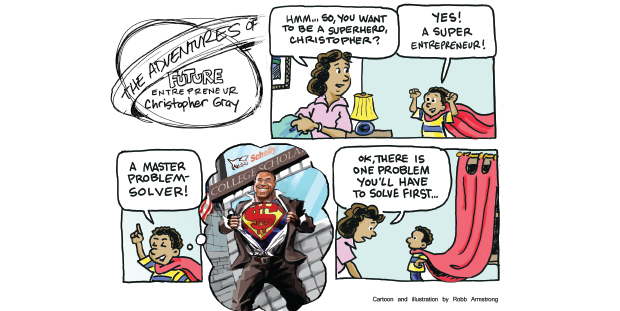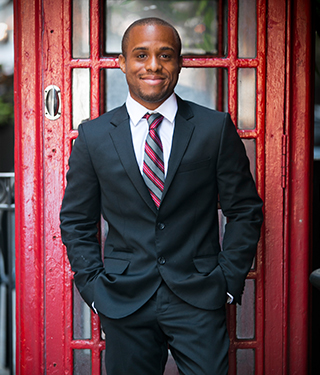
True-Life Superhero
Last summer, Drexel’s entrepreneur community was abuzz with excitement over a big announcement from Josh Kopelman. His investment company, First Round Capital, was establishing a Dorm Room Fund, in which a team of student analysts from the University of Pennsylvania — his alma mater — and Drexel University would assess student startups and award $10K-$20K investments to the most promising among them.
Now-junior Christopher Gray knew he had to apply to become a member of the investment team. Sure, he had a great a resume, boasting prestigious scholarships, the two nonprofits he had founded and good grades. But there was stiff competition over a small handful of spots.
He was elated when he learned he landed one of them.
Gray always knew business would be his major, but mere weeks into his first co-op at Fannie Mae, he realized corporate America wasn’t where he belonged. He was there during a tumultuous time, including a big round of layoffs. And it seemed to him like there were too many rules.
His entrepreneurial spirit would not flourish there, he reasoned. He dropped his concentration in finance and decided to focus exclusively on entrepreneurship.
While he was waiting to hear back about his Dorm Room Fund Investment Team application, he was already in the middle of developing his own dorm room startup. He identified a problem: Thousands of scholarships go unclaimed every year because no one with the right qualifications applies for them. He set out to solve it by creating an app called Scholly.
The idea was to quickly and painlessly connect qualified scholarship seekers with the right scholarships. He recruited two co-founders — Drexel engineering alum Nicholas Pirollo ‘13 and fellow Coca-Cola Scholar Bryson Alef, to handle the technical side, while he personally sifted through thousands of scholarships to include in the app’s search engine. “It was kind of a Steve Jobs move, because I knew exactly what I wanted,” Gray says.

Working part-time, he and his co-founders brought Scholly to market less than six months from the idea’s inception.
People often ask him why he created an app as opposed to a website. “Everything is mobile these days. Most people, especially students, spend more time on their phones than on a computer,” he says. “More importantly, there are a lot of inner-city students who have smartphones but do not have access to a computer. These are the students who need scholarships the most.”
It’s priced at only 99 cents because he wants to keep it accessible to as many people as possible.
Since hitting the market last spring (it’s available through the App Store and Google Play), the app has been downloaded thousands of times. Scholly reached profitability within the first couple of weeks.
“College tuition is one of the biggest issues in the country now. That’s why we were featured in USA Today and on the front page of the Inquirer.” He’s also received coverage from Fox 29 news, WHYY and the Philadelphia Business Journal.
Gray credits his role on the Dorm Room Fund’s investment team with helping him to develop the confidence and knowledge he needed to turn his idea into a successful company.
“We look at lots of student-run startups. It gets us on the other side of the table. And we learn a lot from Josh and the other partners. When it comes time to vote on which startups to fund, our decisions are autonomous. They give us that freedom, which is amazing.”
But the brilliant idea for this app came from his own life experience — a world away from Drexel University and the Dorm Room Fund – back in his hometown of Birmingham, Ala.
When it came time for Gray to apply to college, some people tried to persuade him to limit his options to local colleges with the absolute lowest price tags. Gray ignored them. His mother had inspired him to value knowledge and learning, and he was determined to create his own opportunity for a top-notch education.
Working part-time, he and his co-founders brought Scholly to market less than six months from the idea’s inception.
During his freshman year, a chance meeting with a girl who had won the Gates Millennium Scholarship planted the seed. He decided to make an all-out effort to win as many scholarships as he could. Relinquishing time with friends, Gray spent many afternoons searching the Internet for scholarships, filling out forms and writing and rewriting essays (“the most important part of the application process,” Gray says) with the help of his AP literature teacher.
In the end, he applied for 72 scholarships. He was awarded 34, including two of the most prestigious in the country: he’s a Coca-Cola Scholar and a Gates Millennium Scholar.
The value of his scholarships adds up to $1.3 million. News outlets started calling him the “Million Dollar Scholar.”
Without these scholarships, his future might have been uncertain. Gray was born to a young, single mother in Birmingham, Ala. Life was already hard enough before she lost her job during the economic downturn – just before it was time for Gray to begin applying to college. Adversity like this can prove insurmountable to mere mortals.
You see, Gray isn’t one of them.
Gray has a really big imagination. Inspired by his love of DC Comics, he always imagined himself a superhero.
Sometimes, truth is better than fiction. Today he’s a Drexel student with a national reputation for making the impossible possible.
He’s been laughing in the face of adversity his whole life. For starters, where he comes from, being smart isn’t cool. “The culture glorifies people in the entertainment industry above intellectualism. This was something I had to battle.”
But from Gray’s perspective, many of his peers had it worse: those who did not have family support in terms of their academics. Gray’s mother rejected the notion that school wasn’t important and pressed him to deliver good grades, which he did.
“My mom is Superwoman,” he says.

She sent him to a magnet high school, which was more academically challenging than the regular public high schools in Birmingham, but still plagued by the problems common to underfunded schools like out-of-date textbooks and underfunded student organizations. He was savvy enough to look outside his school for opportunities that would open up doors to him in the future. For example, at one point he set out to do some volunteer work, for the dual effect of satisfying his interest in making a difference in his community and to increase the caliber of his future college applications.
However, he discovered volunteer opportunities in the city of Birmingham were not plentiful, and – ironically – he found himself having to travel to the more affluent suburbs to find opportunities.
This didn’t sit right with Gray. And so he invoked his entrepreneurial spirit and set up his own nonprofit foundation to bring volunteer opportunities for like-minded peers into his city. He named it Genesis.
“I coordinated volunteer events, to teach my peers the value of service. There were a lot of teens who wanted to be able to do those kinds of things, but there was a lack of opportunity. Genesis really filled that gap.” Events set up by Genesis benefited the American Cancer Society, the Ronald McDonald House, Habitat for Humanity and local nursing homes. Some students logged more than 200 volunteer hours through Genesis.
It also laid the foundation for Gray’s future in ways he couldn’t have imagined at the time.
Once he left Birmingham for Drexel, Gray didn’t abandon his commitment to service. Genesis had been so successful and so fulfilling for him, he wanted to repeat the experiment – but this time at the global level.
He established the World Change Coalition, and his first project was helping flood victims in Pakistan. His enthusiasm for the project was contagious. He announced it to the Coca-Cola Scholars’ network. “I went to the group, and it just spread.” More than 150 students got involved. Local businesses and private donors gave money.
The World Change Coalition is still going strong. Its mission is to “use education as a platform to create the next generation of global citizens.”

“In a figurative sense, when you are little you always think that you want to have super powers. And when I got older, in high school, I was still a comic fan, and I realized that I can have super powers. I can’t fly. I don’t have heat vision. But I can solve problems by being an entrepreneur. That’s my flight. That’s my heat vision. That’s my cape.”
“Scholly gives me a greater purpose,” he says. “It will truly help millions of people find scholarships and help solve a really big social issue – paying for college. The fact that it is a sustainable business is an added bonus.”
Since Gray was in fourth grade, people have been telling him that he would make a good politician. “I’m progressive. I like to make sure no one is being oppressed. That’s the thing I’m really passionate about.” He won’t rule out politics completely, but says he can make a bigger impact as an entrepreneur.
“A lot of entrepreneurs think, ‘How can I contribute to the world?’ I think, ‘How can I save the world?’ I try to build things that can save the world instead of just being a part of it.
“Solving problems and saving the world is fun. It’s my duty, and it makes me happy.”


